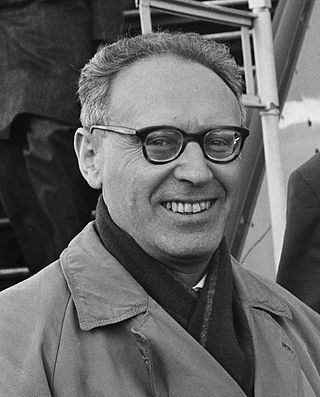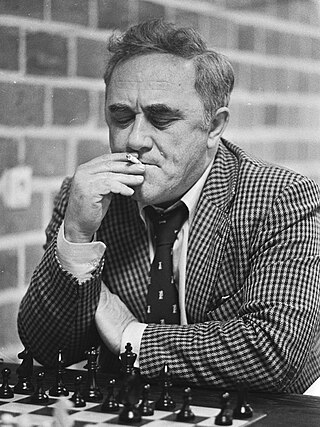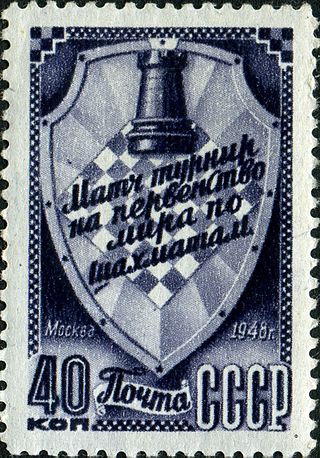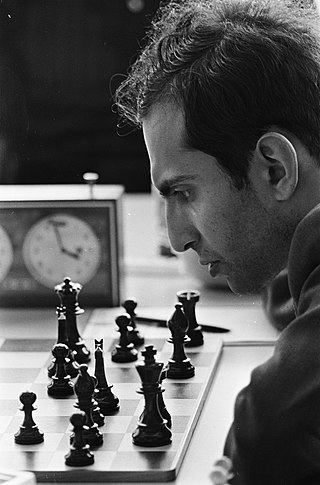
David Ionovich Bronstein was a Soviet chess player. Awarded the title of International Grandmaster by FIDE in 1950, he narrowly missed becoming World Chess Champion in 1951. Bronstein was one of the world's strongest players from the mid-1940s into the mid-1970s, and was described by his peers as a creative genius and master of tactics. He was also a renowned chess writer; his book Zurich International Chess Tournament 1953 is widely considered one of the greatest chess books ever written.

Mikhail Moiseyevich Botvinnik was a Soviet and Russian chess grandmaster who held five world titles in three different reigns. The sixth World Chess Champion, he also worked as an electrical engineer and computer scientist and was a pioneer in computer chess. He also had a mathematics degree (honorary).

Vasily Vasilyevich Smyslov was a Soviet and Russian chess grandmaster who was the seventh World Chess Champion from 1957 to 1958. He was a Candidate for the World Chess Championship on eight occasions. Smyslov twice tied for first place at the USSR Chess Championships, and his total of 17 Chess Olympiad medals won is an all-time record. In five European Team Championships, Smyslov won ten gold medals.

Paul Keres was an Estonian chess grandmaster and chess writer. He was among the world's top players from the mid-1930s to the mid-1960s, and narrowly missed a chance at a World Chess Championship match on five occasions. As Estonia was repeatedly invaded and occupied during World War II, Keres was forced by the circumstances to represent the Soviet Union and Nazi Germany (1941–44) in international tournaments.

Alexander Alexandrovich Kotov (Алекса́ндр Алекса́ндрович Ко́тов; was a Soviet chess grandmaster and author. He was a Soviet chess champion, a two-time world title Candidate, and a prolific writer on the subject of chess. Kotov served in high posts in the Soviet Chess Federation, and wrote most of his books during the Cold War. The importance and breadth of Kotov's work rank him among the all-time greats in this field.

Reuben C. Fine was an American chess player, psychologist, university professor, and author of many books on both chess and psychology. He was one of the strongest chess players in the world from the mid-1930s until his retirement from chess in 1951. He was granted the title of International Grandmaster by FIDE in 1950, when titles were introduced.

Efim Petrovich Geller was a Soviet chess player and world-class grandmaster at his peak. He won the Soviet Championship twice and was a Candidate for the World Championship on six occasions. He won four Ukrainian SSR Championship titles and shared first in the 1991 World Seniors' Championship, winning the title outright in 1992. His wife Oksana was a ballet dancer while his son Alexander was also a chess master. Geller was coach to World Champions Boris Spassky and Anatoly Karpov. He was also an author.
Alexander Kazimirovich Tolush was a Soviet chess grandmaster. He was one of Boris Spassky's mentors. Tolush was born and died in Saint Petersburg. He earned the title of International Master (IM) in 1950, Grandmaster (GM) in 1953, and International Master of Correspondence Chess (IMC) in 1965.

Viacheslav Vasilyevich Ragozin was a Soviet chess player, writer and editor. He was world champion in correspondence chess and held the title of Grandmaster in both over-the-board and correspondence chess.

Igor Zakharovich Bondarevsky was a Soviet Russian chess player, trainer, and chess author. He held the title of Grandmaster in both over-the-board and correspondence chess. Bondarevsky shared the 1940 Soviet title, and later coached World Champion Boris Spassky.

Alexander Markovich Konstantinopolsky was a Soviet chess player, trainer and writer. He was a five-time champion of Kiev, and trained the world title challenger David Bronstein from a young age. He was awarded the title of International Master (IM) by FIDE in 1950, won the first Soviet Correspondence Chess Championship in 1951, earned the IM title at correspondence in 1966, and earned the title of Honorary Grandmaster in 1983.

The 1948 World Chess Championship was a quintuple round-robin tournament played to determine the new World Chess Champion following the death of the previous champion Alexander Alekhine in 1946. The tournament marked the passing of control of the championship title to FIDE, the International Chess Federation which had been formed in 1924. Mikhail Botvinnik won the five-player championship tournament, beginning the era of Soviet domination of international chess that would last over twenty years without interruption.

At the World Chess Championship 1963, Tigran Petrosian narrowly qualified to challenge Mikhail Botvinnik for the World Chess Championship, and then won the match to become the ninth World Chess Champion. The cycle is particularly remembered for the controversy surrounding the Candidates' Tournament at Curaçao in 1962, which resulted in FIDE changing the format of the Candidates Tournament to a series of knockout matches.
Vladimir Alexeyevich Alatortsev was a Soviet chess player, author, and administrator. During his career, he became champion of both Leningrad and Moscow, and played in the Soviet Chess Championship finals nine times, with his best competitive results in the 1930s. He placed clear second in the 1933 Soviet final. He retired from most competitive play in the early 1950s, moving into roles as a chess organizer, teacher, and coach. He served as chairman of the All-Union chess section from 1954 to 1959 and as chairman of the USSR Chess Federation from 1959 to 1961. By profession, he was a hydraulics engineer.
The Piatigorsky Cup was a triennial series of double round-robin grandmaster chess tournaments held in the United States in the 1960s. Sponsored by the Piatigorsky Foundation, only two events were held, in 1963 and 1966. The Piatigorsky Cups were the strongest U.S. chess tournaments since New York 1927.

A World Chess Championship was played between Mikhail Botvinnik and Vasily Smyslov in Moscow from March 16 to May 13, 1954. Botvinnik had been World Champion since 1948 and had successfully defended the title in 1951, while Smyslov earned the right to challenge by winning the 1953 Candidates tournament.
The main organiser of Salzburg 1942, Ehrhardt Post, the Chief Executive of Nazi Grossdeutscher Schachbund, intended to bring together the six strongest players of Germany, the occupied and neutral European countries; world champion Alexander Alekhine, former champion Max Euwe, challenger Paul Keres, former challenger Efim Bogoljubov, winner of European tournament at Munich 1941 Gösta Stoltz, and German champion Paul Felix Schmidt. Euwe withdrew due to "illness". Actually, Euwe refused to participate because Alekhine was invited. His place was occupied by German sub-champion, the eighteen-years-old Klaus Junge. They made Salzburg 1942 the world's second, after a tournament purporting to be the first European Championship (Europameisterschaft) in Munich, strongest tournament in 1942.

The 1940 Soviet Chess Championship was the 12th edition of USSR Chess Championship. Held from 5 September to 3 October 1940 in Moscow. The tournament was won by Andor Lilienthal and Igor Bondarevsky. Twenty of the Soviet Union's strongest masters competed in the final, six of whom qualified in the semifinals in Kiev earlier that year: Eduard Gerstenfeld, Mark Stolberg, Igor Bondarevsky, Iosif Rudakovsky, Alexander Konstantinopolsky and Peter Dubinin. The remaining invitations went to the Soviet chess elite. Botvinnik did his worst championship, only drawing in 5th/6th position, losing matches to both winners. This championship marked the debut of Paul Keres (4th) and the future world champion Vassily Smyslov (3rd). USSR had expanded its territory in 1939-40, incorporating the Baltic states, which meant that the strong masters Paul Keres from Estonia and Vladimir Petrov from Latvia were able to participate. In 1941, the top six played a competition called Absolute Championship of Soviet Union, ending with Botvinnik's victory.

The 1951 Soviet Chess Championship was the 19th edition of USSR Chess Championship. Held from 11 November to 14 December 1951 in Moscow. The tournament was won by Paul Keres. The final were preceded by quarter-finals events and four semifinals.

The 1957 Soviet Chess Championship was the 24th edition of USSR Chess Championship. Held from 20 January to 22 February 1957 in Moscow. The tournament was won by Mikhail Tal. The final were preceded by quarterfinals events at Frunze, Tallinn, Yerevan ; semifinals at Leningrad, Kharkov and Tbilisi.














